Cover Story
Summergrass — Celebrating 10 Years!
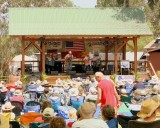
Bluegrass Etc. performs to an enthusiastic crowd last year. Photo by Dennis Andersen.
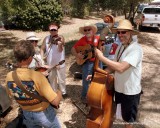
Jamming, a favorite at Summergrass (author and SDBS president Dwight Worden, right). Photo by Dennis Andersen.
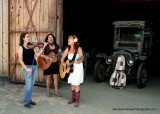
The Lacemakers warm up behind a barn. Photo by Dennis Andersen.
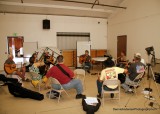
Summergrass guitar workshop. Photo by Dennis Andersen.
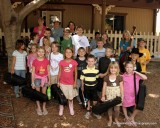
Kids Camp! Photo by Dennis Andersen.
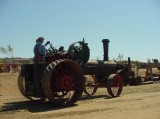
One of the many antique tractors at the Antique Gas and Steam Engine Museum. Photo by Dennis Andersen.
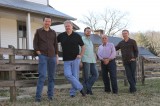
Blue Highway is featured this year
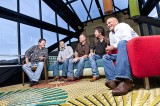
The Lonesome River Band also headlines at Summergrass. Photo by Dennis Andersen.
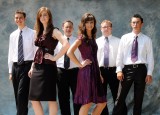
Flatt Lonesome performs and also teaches Kids Camp this year
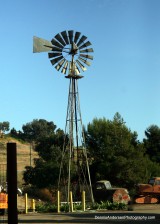
Photo by Dennis Andersen
Ten years ago a handful of prominent local musicians and volunteers sat down over coffee to discuss the bluegrass topic of the day: Why is it so hard to get great touring bluegrass bands to come to San Diego, and what if we started our own festival? Read on to learn about the birth of Summergrass, its struggles and astounding successes, and to see just how powerful and influential committed volunteers can be. It all began with a few visionaries. Quoting legendary anthropologist Margaret Mead, “A small group of thoughtful people could change the world. Indeed, it’s the only thing that ever has.”
By any measure, this year’s 10th annual Summergrass shows just how successful the event has become. Summergrass expects 4,000 to 5,000 people plus over the three-day weekend of August 17 thrugh 19. Two top national and international touring bands are headlining: Blue Highway and the Lonesome River Band, which between them have more International Bluegrass Music Association (IBMA) awards, Grammy nominations, and Grammy awards than you can shake a stick at. They are, quite simply put, the best of the best at the very top of their game. There is a full complement of other music acts: a music academy for youngsters called Kids Camp, an Adult Boot Camp, camping, vendors, on-site workshops, quality instrument raffles, and a variety of other activities that promise to make Summergrass’ tenth anniversary truly special. Let’s turn the clock back and see how it all began.
THE BEGINNINGS
The history of bluegrass festivals in San Diego must begin with mention of the Julian Banjo and Fiddle Contest, now entering its 41st year. In its heyday during the 1970s thousands of people attended every fall. In the face of declines in attendance in later years, San Diego’s two non-profit bluegrass organizations, the San Diego Bluegrass Society (SDBS) and the North San Diego County Bluegrass and Folk Club (NCBFC), agreed to run the event in 2000. The hope was that the knowledge, experience, and musical connections of these two organizations could revitalize Julian’s event. After running the musical portions of the event for two years, however, it became apparent to SDBS and NCBFC that the site’s constraints (steep hillside, no on-site camping, closing at dusk, and the long drive) were tough obstacles to overcome. So, key leaders of both groups began to discuss the idea of a new San Diego festival that would be welcoming to visitors, that could accommodate camping, and where important touring bands could be presented at a site easily reached by San Diego’s large population centers.
The search for a site was on. No one on the informal steering committee (Corky and Debbie Shelton, Sandy and Richard Beesley, Roger and Gretchen Gagos, Mike and Vonnie Tatar, Dwight Worden and Betty Wheeler, Kit and Mary Birkett, Jerry and Judy Hass, and a handful of others) had any real idea exactly how to start a festival and nobody had a budget. In fact, all this group had was a vision.
Soon, one of these early founders, Corky Shelton, recommended the Antique Gas and Steam Engine Museum in Vista as a potential site. The steering committee visited the site and liked what it saw. The location had a nice grassy area fronting a small stage, areas that could accommodate camping, offer plenty of parking, and feature lots of interesting buildings and displays. Discussions were had with the museum management and soon an agreement was reached. The music festival, as yet unnamed, would take place in August 2003 with SDBS and NCBFC organizing and presenting all the music, paying the bands, and keeping the ticket revenues. They would organize and run the camping, but the museum would get the camping revenues. The museum would also provide all the food services and keep those revenues. In exchange, the museum would make the grounds and stage available for the music festival at no charge, and the museum would assume responsibility for basic services like restrooms and trash.
An agreement was then crafted between SDBS and NCBFC, specifying that these two non-profit organizations would present the festival as 50-50 joint-venture partners, equally sharing any costs, revenues, or losses. It was also agreed that each organization would put up $3,000 of seed money. And, it was decided that a music academy for young people would be an important part of the festival, starting in 2004, as would be the presentation of local bands to complement the hoped-for national and international bands to be recruited. As representatives of non-profit organizations, these founders had three overall goals in mind. First, to bring top-quality bluegrass to San Diego that otherwise could not be seen locally. Second, through workshops, the youth academy, and other strategies to provide significant educational opportunities promoting bluegrass music, and third, to provide an opportunity for local bands to perform at a first class event.
With a site secured, agreement on a basic mission, and a $6,000 beginning budget, it was time to start hiring bands and planning the details.
YEAR ONE: 2003
Year one had a budget for hiring bands of about $20,000. Cash in hand was only $6,000, but the steering committee took a bit of a flyer, assuming that bands could be selected and hired in the fall to perform in August, and that pre-event ticket revenues would come in before the festival, which were sufficient to pay bands at the time the festival took place. The strategy worked and the festival actually turned a small profit in its first year. A name was still needed as well as a logo. The name “Summergrass San Diego — Picking in Paradise” was selected and volunteer Gretchen Gagos designed the first logo. Since then, the name has been shortened to “Summergrass” and a new logo was designed by Blaise Nayukos.
Musically, the steering committee wanted to put this new festival on the map in a profound way. A special band was needed to be the anchoring headliner. Sandy Beasley, of NCBFC, had connections with Byron Berline and Dan Crary, two of the most well-known bluegrass musicians of all time. She was able to persuade these two to present a reunion concert at the first Summergrass by the super popular band California of which these two stars were members.
California (Byron Berline, Dan Crary, John Hickman, John Moore, and Steve Spurgeon) had been the rage in the 1980s and ’90s as one of the most popular bands of all time, and it was a real coup for Summergrass to be able to present their reunion performance. Many people came to that first Summergrass expressly to hear California. The band delivered in spades with presentations that are still talked about and fondly remembered. Also recruited for Summergrass’ first year was the very popular band Bluegrass Etc., which has, in many ways, become a sort of house band for the festival, having made many repeat appearances. That first year’s musical program was filled out by the respected traditional band Ron Spears and Within Tradition and a complement of other regional and local bands.
In that first year of 2003, legendary fiddler Mark O’Connor was living in the Vista area of San Diego (he has since moved to New York), as were Sean and Sara Watkins of the band Nickel Creek, which was just setting out on what was soon to become a stellar career that included Grammys and sales of a million and a half records. The Summergrass steering committee was hopeful that one or more of these high-profile musicians would attend. Multiple Grammy winner Mark O’Connor did show up, refused his comp ticket at the gate, and insisted on buying a ticket. Even better, Mark got up on stage with a borrowed fiddle and played triple fiddles with Byron Berline of California and Dennis Caplinger of Bluegrass etc. The moment was truly magical and is considered one of the all-time Summergrass moments that has reverberated throughout the bluegrass world ever since.
While Sean and Sara Watkins were unable to attend that first year they did return in subsequent years to make their own memorable appearances, including a fiddle extravaganza in 2005, featuring the triple fiddles of Gabe Witcher (Witcher Brothers, Jerry Douglas Band, and now Punch Brothers), Stuart Duncan (Nashville Bluegrass Band), and Sara Watkins (Nickel Creek) backed up by Sean Watkins (Nickel Creek) on guitar.
The Troubadour has been a Summergrass supporter since year one, and for several of the early years the August issue of the publication served as the official Summergrass Program, handed out at the entrance gate. The collaboration between Summergrass and the Troubadour has continued every year since.
KIDS CAMP
In 2004, Summergrass decided to hire a young band from Alaska, called Bearfoot, not only to perform on the main stage but also to teach Kids Camp. The idea was to present top-notch performers on the main stage who were still in their late teens and twenties and then have these young pros teach the kids who, hopefully, might conclude, “Hey, maybe I could do that.” The strategy seemed to work as the first year’s camp was a success, and this important part of the Summergrass experience has continued to grow and improve every year.
Summergrass looks back proudly on the fact that in its early years the Kids Camp included talented youngsters who subsequently went on to great success. Christian Ward, a student at the camp for several years, now tours nationally with Sierra Hull. He even returned one year to teach at the camp. Sebastian Green was so young and small in his first year at the camp that he had to stand on a stool to play the bass on stage. Sebastian is now a standout player on guitar with the local band Next Generation; last year he secured one of the coveted places at IBMA’s annual event in Nashville, Kids on Bluegrass (previous participants in IBMA’s Kids on Bluegrass include Chris Thile [Punch Brothers], Cody Kilby [Ricky Skaggs and Kentucky Thunder], and Michael Cleveland [Michael Cleveland and Flamekeeper] to mention a few).
John Mailander, who performs on the main stage this year, was also a student through several of the early years of the camp. He is now about to graduate from the Berklee School of Music in Boston and is starting his own touring and professional career as a player and teacher. Dalia Flores, a regular at the Camp, currently performs with the San Diego Youth Symphony, and Summergrass student Orion Johanning went on to win first prize on banjo at the Topanga Banjo and Fiddle Contest. Today he also plays with Next Generation. Likewise, youngster Shira Ellisman, a camp student in the early years, has done well in fiddling competitions as she now enters her teen years.
This year’s Kids Camp will be taught by the hot young band Flatt Lonesome, complemented by several other outstanding teachers; a full class enrollment is expected. History tells us that some of this year’s young students will go on to bluegrass stardom. As an important part of its non-profit mission Summergrass accepts tax deductible donations, including to the Kids Camp, and confidential scholarship support is available to those in need.
NEW STAGE, CAMPING, JAMMING, VENDORS, RAFFLES
Each year Summergrass has continued to grow and improve. The Museum was so excited after the first year that it decided to build a new and better stage. With donations from SDBS, NCBFC, and others, and after recruiting volunteer students from Palomar College, a state-of-the-art stage was built. The stage was, and is, stunningly beautiful and provides an excellent viewing opportunity for the audience, with lots of room and amenities for the performing bands.
The camping aspect of Summergrass quickly grew as well and the main camping lot (dry camping, optional electricity) is regularly sold out. There are also secondary camping areas and a generator-free area for those seeking quiet. One can hear bluegrass music into the wee hours on the campgrounds, and some legendary jam sessions comprised of talented amateurs and performing professionals have occurred. Some people come to Summergrass just for the jamming and rarely even visit the main stage performances, that’s how great the jamming is!
Vendors have also been an important part of the Summergrass experience, featuring top music stores like Buffalo Brothers, New Expression Music, and Tricopolis Records, as well as a variety of other vendors. These vendors provide a great browsing and shopping experience to complement the musical performances. Deering Banjos, Martin Guitars, and other top instrument companies have also been solid supporters, donating quality instruments for the ever popular Summergrass raffles.
As an overall experience, Summergrass is hard to beat. Not only is the music top quality, as are the educational opportunities, but the Museum also features lots to interest family members and others, including a new weavers building that contains the largest collection of looms west of the Mississippi, a working blacksmith shop, grist mill, a miniature railroad, historic schoolhouse, and other artifacts from the past.
The Museum is dedicated to presenting rural American farm life as it was from 1850 to 1950, and boasts one of the largest collections anywhere of antique farm equipment. Summergrass often includes a parade of these belching and popping antique steam-driven tractors. It’s quite a sight to see. There are also tours of the neighboring historic Adobe, an on-site gift shop, a clown and kids activities, a very popular “Jamming 101” class (free) taught by Sid Lewis, great breakfasts and food service by the Museum, and plenty to see and do for all ages. This makes Summergrass an ideal family experience.
In 2010 Summergrass added an Adult Boot Camp. The Kids Camp had become so successful that many adults expressed interest in having a similar experience. In response, the Adult Boot Camp was born. Much like the Kids Camp, top quality performers are hired to teach intensive classes over the three days of Summergrass, but for Boot Camp the students are intermediate to advanced adults, with class size limited to 10 students. Boot Camp is already making its mark as a popular and successful activity. This year’s Boot Camp will be taught by Blue Highway with Phil Boroff of New Expression Music teaching rhythm guitar and Jack Tuttle teaching fiddle.
MUSICAL HIGHLIGHTS
Summergrass has seen way too much music over its 10 years to give a complete rundown of musical high points in this article. But, we can point out a few highlights.
– Fragment, whose members all hail from the Czech and Slovak Republics, made its first U.S. appearance at Summergrass in 2004. There was a large turnout from the local Czech and Slovak communities (yes, there is one), and Fragment stunned the Summergrass audience with the Alison Krause-like singing of Fragment’s lead singer and the overall quality of the band. Fragment went on to a successful career nationally and internationally and made a repeat appearance at Summergrass.
– Summergrass has brought many top quality bands to San Diego that had never been here before, including Blue Highway (returning this year and teaching Adult Boot Camp), the Nashville Bluegrass Band, the Grascals, Country Current, the Infamous Stringdusters, Wayne Taylor and Appaloosa, and many others. The Lonesome River Band, headlining this year, is also making its first San Diego appearance.
– The triple-fiddle presentation by Stuart Duncan (Nashville Bluegrass Band), Gabe Witcher (Punch Brothers), and Sara Watkins (Nickel Creek) was the first, and only, time these three stars had played together in this fashion. An added highlight of this fiddle extravaganza occurred when these three fiddlers did a masters class workshop for the Kids Camp, letting the kids watch and listen as the three fiddlers prepared for their stage performance, giving a rare backstage experience to the youngsters.
– A triple mandolin performance featuring Mark Miracle (X Train Bluegrass Band), John Moore (Bluegrass Etc.), and Emory Lester (Wayne Taylor and Appaloosa) was unforgettable.
– The appearance of the U.S. Navy Band Country Current in 2006 was memorable, and band leader Wayne Taylor returned with his new band Wayne Taylor and Appaloosa to great crowd reviews.
– Appearances by the Infamous Stringdusters pushed the envelope by introducing many to the modern side of top quality bluegrass. The “Dusters” also taught the Kids Camp, giving that year’s students an unforgettable experience.
– The Triple Resonator guitar presentation by Rob Ickes (Blue Highway), Michael Witcher (Witcher Brothers, Missy Raines Band), and Andy Hall (Infamous Stringdusters) was a jaw dropper for resonator guitar fans.
– Few will forget the appearance of Chris Hillman and Herb Pedersen doing a memorable duet together.
Many great performances have been heard from local bands as well, including the 7th Day Buskers, Tim Flannery, Virtual Strangers, Gone Tomorrow, Second Delivery, Prairie Sky, the Taildraggers, Sarah Petite, Laurel Canyon Ramblers, the Witcher Brothers, Cliff Wagner and Old #7, Les and Lou Ann Preston, Old Town Road, the Full Deck, Lighthouse, and many more. There are many other musical highlights and no doubt each attendee has his or her own favorites. That this local festival is loved and respected is confirmed by the many, many, people who return year after year. There is a large number of people who have attended every single Summergrass and consider it the highlight of their musical year. One couple from Australia even wrote that when they pass, they hope their souls pass through Summergrass!
What remains truly amazing about all this is that it is all done with the help of its volunteers. The volunteer board members of SDBS and NCBFC serve as the official board of directors of Summergrass, and an informal steering committee chaired by SDBS Board member Mike Tatar, Sr., takes on the day-to-day decisions. Overall, more than 100 volunteers are involved in producing the annual event. A volunteer barbecue and party, coupled with volunteer training, is held in early August each year. Volunteers can earn free admission to Summergrass and many return every year. Those interested in volunteering can visit the Summergrass website at www.summergrass.net. With its all-volunteer base Summergrass is truly a community event.
In the beginning there was a need for more shade in the main audience area. Tents and awnings were way too expensive for the young festival. Enter Corky Shelton who had a connection on the East Coast which, he said, might send out a used parachute. Corky felt he could build a structure to raise the parachute to create shade. Since the price of the chute was right — free — and given Corky’s background as a skilled builder, the decision was “go.” What is now affectionately called “the green jelly fish” is erected each year to provide shade, and to entertain, as the parachute billows in the wind.
In one year, however, Summergrass learned the hard way that parachutes are not waterproof. Yes, there was one year when it rained — not a small drizzle but real rain. During the Sunday morning gospel set, presented by the Virtual Strangers, the music was moved under the green jelly fish to avoid the rain, but it soon became apparent that the water was dripping right through the parachute. Fortunately, this was Summergrass’ one and only rain event.
THIS YEAR
If you like bluegrass music, the chance to hear popular bands, opportunities for jamming, learning, and relaxing, you’ll want to put this year’s Summergrass on your calendar. If you need to talk the family into going, remind them of the interesting aspects of the Museum and of the many non-musical activities on-site. Visit the Summergrass website for tickets, information, the daily schedule, to sign up for Kids Camp or Adult Boot Camp, for information on volunteering or making a donation, and to see the daily schedule and bios of the performers. www.summergrass.net.
Headlining this year’s Summergrass is Blue Highway. At the 18-year mark, Blue Highway is indisputably one of the most esteemed and influential groups in contemporary bluegrass. The band’s nine exceptional albums and compelling live performances give proof to the stellar reviews, Grammy nominations and numerous awards have been earned by the band since it first took the stage on in 1994.
Most bands are lucky to have one great songwriter and lead singer. Blue Highway has an unprecedented three. Tim Stafford, who has penned such classics as the a cappella gospel tune “Someday,” has a lead singing voice that once joined Alison Krauss when he was a member of her band. Bass player Wayne Taylor (not to be confused with the Wayne Taylor of Appaloosa), who has written a number of classics and has a warm, deep voice, sings lead on many of the Blue Highway’s songs. Sean Lane has also written a number of memorable tunes and has a tenor voice, honed during his time with Doyle Lawson and Quicksilver, considered among the best in bluegrass. Rob Ickes, the most awarded individual instrumentalist in IBMA history, having won “Dobro Player of the Year” 13 times, contributes spectacular instrumentation and smooth harmony vocals. Jason Burleson presents hard driving, classic Scruggs-style banjo and harmony vocals as well.
Complementing Blue Highway as headliner is the Lonesome River Band, one of the most respected names in bluegrass music. Longtime band member and award-winning banjo picker Sammy Shelor, has put together a wealth of talent that includes Brandon Rickman (lead vocals and rhythm guitar), Mike Hartgrove (fiddle), Barry Reed (bass), and newest member Randy Jones (mandolin and vocals), all performing the distinctive LRB sound fans love. The band has been awarded the IBMA Album of the Year and Sammy Shelor is an impressive four-time IBMA Banjo Player of the Year winner, as well as the the second winner of the annual Steve Martin $50,000 banjo player of the year award in 2011.
Other noteworthy bands. Flatt Lonesome will make its first Summergrass appearance this year. While deeply rooted in bluegrass music’s historic classics, Flatt Lonesome also has an energetic flair for country sounds, progressive jams, and soul-stirring gospel music while never forsaking the traditional essence of bluegrass’s roots. Molly Tuttle, John Mailander, Matt Witler, and Brittany Karlson will be appearing as well. Though their name sounds like a law firm, make no mistake, these young musicians can deliver great music. Each is an individually renowned up-and-coming musician in the acoustic music world. The foursome will be together for two sets of dynamic original and traditional music. All four are currently studying at the Berklee College of Music in Boston. Chris Henry and Hardcore Grass will also make a Summergrass debut. This group is a five piece bluegrass band based in Nashville, Tennessee. Founded in 2012, the group has risen quickly to be one of the most popular bluegrass groups in Nashville.
From the ever growing pool of local talent Summergrass will present Sweet Tidings, comprised of Kimberly Conley, David Dickey II, Diana Hergert, Don Hergert, and Marc Nelissen. This L.A.-area group plays hymns and traditional gospel music with an emphasis on Americana roots gospel done jam-style. San Diego is also proud to claim Chris Stuart and Janet Beazley as a local act. The words “fresh” and “traditional” don’t often apply to the same musical group, but they do in the case of this duo. Their award-winning act delivers traditional-sounding original songs and fresh-sounding traditional songs with guitar, banjos, pennywhistles, and harmony vocals in the tradition of the great duos of the past, such as the Delmore Brothers, Louvin Brothers, and Stanley Brothers. Chris’ songs have been recorded by many bluegrass and folk artists such as Claire Lynch, Dale Ann Bradley, Danny Paisley, Larry Cordle, Michael Cleveland, Bobby Osborne, and Doyle Lawson; Janet is a nationally known banjo player and teacher. Rounding out the local talent is the Virtual Strangers, making one of many repeat appearances at Summergrass, as well as the Taildraggers and long-time local band Lighthouse.
The Kids Camp will be going strong this year. The main faculty band is Flatt Lonesome. All three fun-filled days include instrument classes and stage performance classes for kids aged 6-16. Kids Camp concludes on Sunday with what is always a Summergrass highlight: a 30-minute main stage performance by the kids and their teachers. To learn more or to register, visit www.summergrass.net.
Workshops are offered throughout the three days of Summergrass, free with your Summergrass admission. No advance registration is required. You can simply drop in on the sessions that interest you. This year’s workshops include “meet the band” sessions with headliners Blue Highway and the Lonesome River Band. Under this intriguing format, the audience gets to meet with each of these bands, ask questions, and discuss topics of interest. This is a great chance to get to know some of bluegrass music’s top performers and is expected to be a popular Summergrass event.
The Summergrass boot camp is focused on adults of intermediate ability or better who are looking to enjoy an intense learning experience with top quality teaching professionals. Boot Camp focuses on instruction in all the basic bluegrass instruments. Boot Camp meets for four hours on Friday with an optional one hour on Saturday. Class size is limited to 10 students, giving participants more access to the instructor. Confirmed registrants will receive detailed information about the camp. To learn more or to register visit: http://summergrass.org/boot-camp.htm.
CONCLUSION
All of San Diego, and especially its music community, can be proud of Summergrass. If you have never attended you won’t want to miss this year’s 10th year anniversary August 17-19. You will hear great music, have an opportunity for unparalleled educational experiences, participate in memorable jamming and camping experiences, eat good food, and enjoy an outstanding weekend at reasonable prices. Summergrass has something for everyone, so bring the whole gang. For tickets or to learn more, visit www.summergrass.net. I’ll look for you there.










